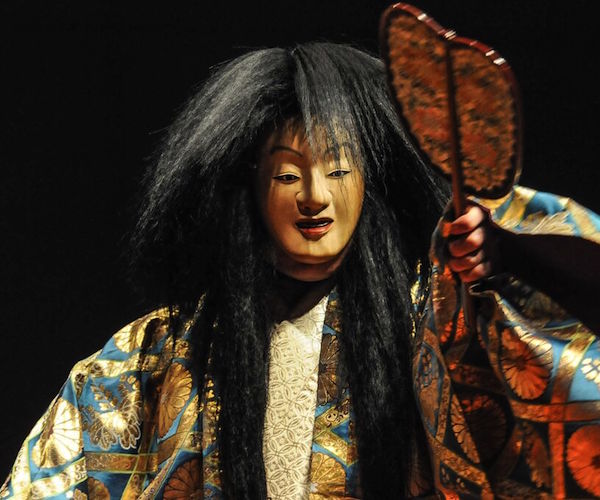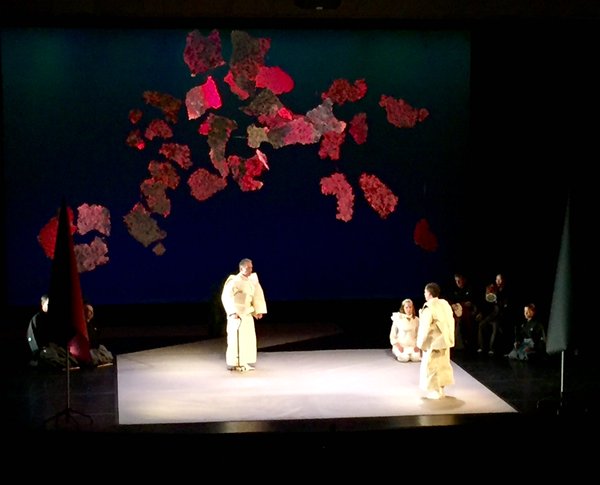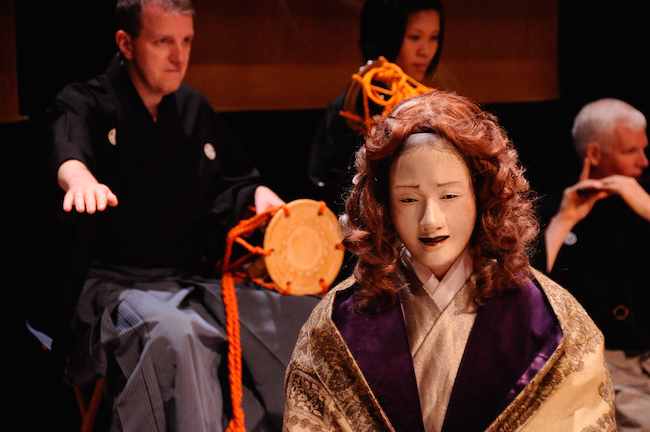Theater Review: Theatre Nohgaku — Noh Plays With and Without an American Accent
Zahdi Dates and Poppies demonstrates that the formal aspects of Noh can be adapted to contemporary American themes in a manner that resonates.
Sumida River by Kanze Motomasa. Translated from the Japanese by Richard Emmert. Directed by Richard Emmert. Zahdi Dates and Poppies: A Warrior Play by Carrie Preston. Music by David Crandall. Directed by Jubilith Moore. Performed by Theatre Nohgaku. Presented by The Boston University Arts Initiative at Tsai Performance Center, Boston University, Boston, MA. March 30 & 31.

Theatre Nohgaku in action at Boston University. Photo: Clive Barda.
By Ian Thal
Noh is one of a number of classical Japanese art forms that has largely persisted as a museum piece since the nineteenth century. After Japan’s embrace of modernity, first as an imperialist power and then as a major commercial force, Noh’s practitioners have largely come to see their role as preserving the art form as it existed at the end of the Edo period in 1868. While women began performing in what had been an exclusively male art since the post-WWII period, the repertoire has not expanded beyond the 240 plays that were were in favor with the aristocratic audiences at the end of the Edo period.
Ironically, Noh served as an inspiration for modernists seeking to break the stranglehold of realism on western theater: there’s unmistakable influence, ranging from mime-pedagogues such as Étienne Decroux and Jacques LeCoq to dramatists, Samuel Beckett and Thornton Wilder among them.
So Noh lives – but what kind of life is it leading? Theatre Nohgaku is an American company whose mission is not only to present classic Noh plays in English but to foster the creation of an English language Noh repertoire. Nohgaku’s recent performance at the Tsai Performance Center, the culmination of a week-long residency at Boston University, suggested that it was serving its dual purpose well.
Sumida River, is one of the better known ghost stories that play a significant role in the Noh canon (Benjamin Britten’s opera Curlew River is a Christian adaption of this Buddhist tale). A ferryman (David Crandall), a traveller (Matthew Dubroff), and a madwoman (Richard Emmert, who also translated and directed the piece) meet and cross the Sumida together. On the opposite bank, a solemn funeral procession is observed. A year prior, a child had been abandoned by the side of the road by slave traders. He had been cared for by the locals; still, death had followed the (unspecified) abuses of the ordeal. It is revealed that the madwoman is the mother of the missing child and she venturing to his burial mound to pray. After a reunion with the ghost of her son (Mai Lisbeth O’Connor, a third grader making her debut with the company), both the mother and the child’s spirit are granted peace.
The story may be simple, but the performance is slow and precise. Sumida River took slightly more than an hour to perform (the opening entrance was reportedly trimmed for time in this performance). The audience is asked to look and listen carefully: to appreciate the purity of the performers’ movements, their stylized vocal delivery of the poetry (delivered in five and seven syllable lines), and the interaction between their singing and the percussion, flute, and vocalizations of the musicians. Emmert’s dance as the madwoman was a highlight — a brilliant example of kinesthetic mastery; the result of decades of honing his craft.

A scene Theatre Nohgaku’s “Zahdi Dates and Poppies.” Photo: Boston University Arts Initiative Twitter.
The second offering of the evening, Zahdi Dates and Poppies reflected the second aspect of Nohgaku’s mission: to create new Noh plays for an English-speaking audience. Though playwright Carrie Preston, Director of Women’s, Gender, & Sexuality Studies at Boston University (and who was instrumental in arranging for Nohgaku’s BU residency but could not be present at the premiere due to the birth of her second child) does not consider this script to be properly Noh, it uses the performance techniques and the formal elements of the venerable form to tell a contemporary American story.
Preston’s play was inspired by her husband’s experience as a U.S. Marine fighter pilot serving in Iraq, or more precisely, coming home and making sense of with his troubling experience. A wife (Colleen Lanki), who, like the author, is a poet, has written a shidai, a lyric form made use of in Noh, for her husband (Tom O’Connor), a pilot. Not surprisingly, he responds in a stylized prose that is also used in the form. At home, he grapples with the trauma of war: he has doubts about the mission, but hopes to assuage his conscience with the thought that, because he provided air support, he was saving fellow marines on the ground. But when he encounters a wounded marine (Kevin Salfen) stateside who had been part of a unit he protected, he can’t help but think of the fourteen people he did kill:
All men, aged sixteen
to thirty, standard
for insurgents, no
women, no children,
so no civilians, we think
They still weigh on his conscience. The husband then has a vision – a dream in which he visualizes one of the insurgents he killed (John Oglevee, in the sole masked role in the piece). They relive the battle in verse and movement. The husband imagines his vicim to be a man much like himself, also married, with a wife (Lanki, again) who is an avid reader of poetry (that of the late Syrian-born expatriate Nizar Qabbani, specifically). When the pilot discovers commonality with an enemy he had to kill to save other lives, the insurgent cleanses the American of his guilt.
Though Zahdi Dates and Poppies was performed in a slow and precise manner, the piece’s forty-five minutes moved at what seemed to be a speedy clip — at least when compared with the pace of Sumida River. The ensemble was striking in how they created archetypical figures with a few well-chosen yet minimalist gestures. Salfen’s entrance with a crutch — his walk both careful yet broken — hinted at the influence Noh may have had on Butoh, an avant-garde Japanese dance form. Another affecting moment — the martial dance between O’Connor’s pilot and Oglevee’s insurgent.

Theatre Nohgaku in action at Boston University. Photo: David Surtasky.
Traditional Noh does not trade in theatrical illusion, and the design sensibility of Zahdi Dates and Poppies stayed firmly in the realm of the symbolic — even though it stepped away from the traditional (and gorgeous) backdrop of a pine tree (painted by Kana Niikura) used in Sumida River. Stage designer Josh McDermott used the almost bare stage marvelously: large, ragged sheets of hand-made artisan paper hung from above, which, depending on the mood of the scene or the lighting, could either stand for clouds, autumn leaves, or pieces of shrapnel from an explosion, frozen in time. Kanako Abe’s costumes had their own compelling symbolism. Inspired by a stage direction mentioning paper airplanes, the pilot’s uniform was a large jacket made of paper airplanes, while the insurgent’s outfit was made of origami patches and envelopes. The paper ‘clothing’ is simultaneously stiff, flexible, and fragile — like scar tissue. The white surfaces subtly reflected the shifting colors of Sabrina Hamilton’s lighting design. With only a scarf, the elegantly simple gown of the American wife was transformed into the head covering for an Iraqi wife. Hideta Kitazawa’s mask design works within the tradition of the Noh style, even as he creates a distinctly American projection of those on the ‘other side’ of warfare in the face of an Iraqi insurgent.
Zahdi Dates and Poppies, demonstrates that the formal aspects of Noh can be adapted to contemporary American themes in a manner that resonates. In this case, dramatizing an ambivalence many Americans, whether they served or not, have about the Iraq War. The insurgent is a product of the pilot’s imagination; the play looks at Iraq through American eyes. But, of course, Iraqi insurgents were no figments of our fantasies. In Amir Al-Azraki’s Waiting For Gilgamesh the Iraqi playwright suggested some of the ways that Iraqis have some share of blame for what they have done to each other, often for sectarian or ideological reasons. Some insurgents may very well have been normal men with guns who simply did not want Americans in their land; others were fighting on behalf of some remnant of the former Baathist regime; some had been Shia militias affiliated with Iran, and yet others were progenitors of the sort of Sunni extremists who now call themselves the Islamic State. And while some were and are, no doubt, secularists, others fight with an ecstatic sense of their own martyrdom. Can the theater be used to tell a ghost story that accounts for that complicated narrative as well as assuage our own sense of post-traumatic stress? Would a martyr release the American who killed him?
These questions may not have an answer. But asking them is more than worthwhile. Particularly in so stylized a fashion, so unsuited for a plasma screen, and so far from the pseudo-naturalism that has such a depressing death grip on the American theater scene. Zahdi Dates and Poppies exerts a powerfully cathartic effect on an audience, and this could only happen on stage. Noh was once entertainment for aristocrats, Theatre Nohgaku proves it has many valuable things to teach us today.
Ian Thal is a playwright, performer, and theater educator specializing in mime, commedia dell’arte, and puppetry, and has been known to act on Boston area stages from time to time, sometimes with Teatro delle Maschere. He has performed his one-man show, Arlecchino Am Ravenous, in numerous venues in Massachusetts and Rhode Island. One of his as-of-yet unproduced full-length plays was picketed by a Hamas supporter during a staged reading. He is looking for a home for his latest play, The Conversos of Venice, which is a thematic deconstruction of Shakespeare’s The Merchant of Venice. Formerly the community editor at The Jewish Advocate, he blogs irregularly at the unimaginatively entitled The Journals of Ian Thal, and writes the “Nothing But Trouble” column for The Clyde Fitch Report.
Tagged: Boston University, BU Arts Initiative, Carrie Preston, Noh plays, Sumida River, Theatre Nohgaku
